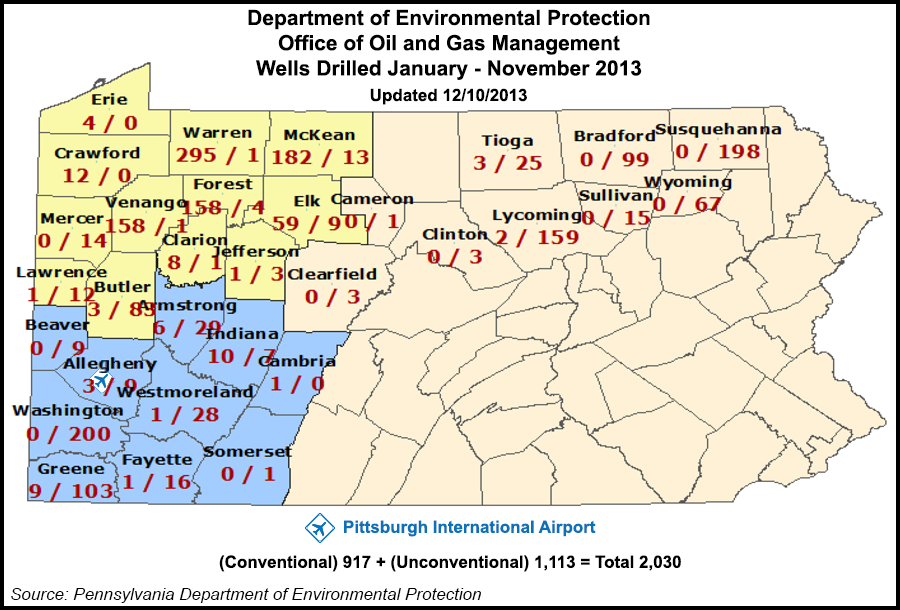Marcellus | E&P | NGI All News Access
Consol to Employ Electric Engines For Pittsburgh Airport Drilling
Billing its plan to drill 45 Marcellus wells at the Pittsburgh International Airport (PIT) a “flagship endeavor,” Consol Energy Inc. outlined plans on Tuesday to use electric engines to power both its vertical and horizontal drilling rigs in order to comply with federal environmental guidelines.

Consol was forced to consider the move because the government partially oversees the airport and dedicates subsidies to some of its operations. The company said it would be the first time it will use electric power to run its rigs.
Consol has been meeting regularly with the Federal Aviation Administration (FAA), U.S. Environmental Protection Agency, Army Corps of Engineers and the U.S. Fish and Wildlife Service, as well as Allegheny County officials as it finalizes plans to drill the Marcellus wells on six pads across 8,800 acres under a proposal approved by the county in February (see Shale Daily, Feb. 21).
The project could generate up to $500 million for the county over the next 20 years, with a signing bonus of $50 million already delivered, and 18% royalties on all future production.
“The expected revenues have already resulted in reducing the fees for airlines operating at PIT, which will help in developing new air service,” said Allegheny County Executive Rich Fitzgerald.
At a final public hearing on Tuesday at the airport Marriott, Consol said it expects that it will near pollution limits in the second year of drilling at the airport. If it does, drilling would have to be halted.
Due in part to population density, drilling in Allegheny County this year has been fairly quiet compared to surrounding counties. According to Pennsylvania Department of Environmental Protection data updated through November 2013, three conventional wells and nine unconventional wells have been drilled in the county this year, while zero conventional wells and 200 unconventional wells have been drilled in neighboring Washington County to the west. Statewide, 917 conventional wells and 1,113 unconventional wells have been drilled so far this year.
Consol Spokeswoman Kate O’Donovan said vertical rigs would be powered mostly by diesel fuel, with a smaller portion of their horsepower coming from electric engines, while horizontal rigs would be powered entirely by electricity. Construction of the well sites and three impoundments is expected to begin in the second quarter next year and drilling activity will commence in July. Two vertical rigs will kick the program off, with plans to reduce to one vertical rig and one horizontal rig once operations are in full swing. The program will last through 2018.
Both diesel fuel and cleaner-burning natural gas would produce too much emissions, according to Consol, while electric energy will help reduce by three tons the amount of pollutants generated at each well.
“Technology and innovation continue to define the shale opportunity and Consol Energy continues to push the envelope to find new and better ways to unlock the potential of this once-in-a-generation opportunity,” said Consol President Nicholas Deluliis in a statement.
Consol submitted an environmental assessment study to the FAA in November, with public comment expected to last through the end of this month. O’Donovan told NGI’s Shale Daily that she expects the report to be made public sometime in February, adding that there’s no reason to believe the FAA would object to Consol’s plans, saying “everything has gone according to plan” thus far.
© 2024 Natural Gas Intelligence. All rights reserved.
ISSN © 2577-9877 | ISSN © 2158-8023 |
